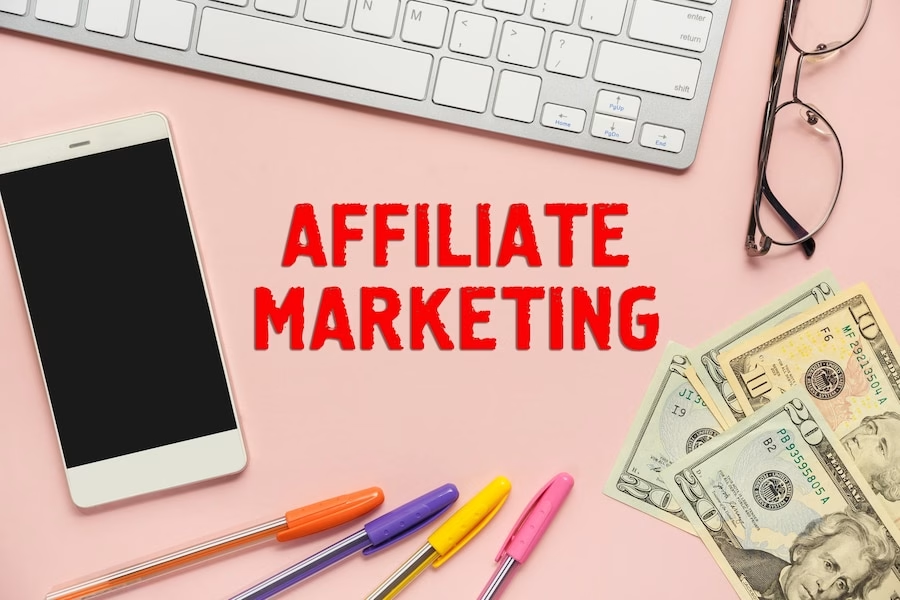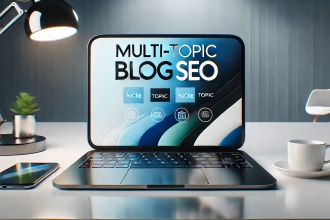Understanding Affiliate Marketing with AI in 2025
Affiliate marketing has long been a popular method for businesses and individuals to generate revenue by promoting products or services and earning commissions on successful conversions.
As we advance into 2025, this industry continues to evolve, powered by sophisticated tools and technological developments. At the forefront of these advancements is Artificial Intelligence (AI), reshaping how affiliate marketers strategize, engage audiences, and maximize earnings.
Today, you’ll find that affiliate marketing is no longer limited to creating generic content or relying solely on traditional audience analytics. AI has unlocked new possibilities, offering tools that allow you to automate, personalize, and optimize your campaigns like never before.
These tools help analyze user behavior, predict trends, and deliver hyper-targeted content that aligns with specific consumer needs all in real-time.
Impact of AI in Modern Affiliate Marketing
AI is now integral to performing tasks such as keyword research, content creation, and conversion tracking. For instance, Natural Language Processing (NLP) technology can assist you with writing SEO-optimized articles tailored to rank higher on search engines.
Similarly, AI-powered analytics help you gauge campaign performance and adjust strategies with unparalleled accuracy.
Moreover, AI-driven chatbots and voice assistants are redefining how brands interact with potential customers. By incorporating these technologies, you can provide seamless customer support and maintain a strong online presence across multiple channels.

You’ll also notice an increasing reliance on machine learning algorithms to predict the highest-converting products and promotional strategies, saving significant time and resources.
Adopting AI in affiliate marketing doesn’t simply boost efficiency, it also ensures you stay relevant in a competitive, rapidly evolving digital landscape.
Transitioning from traditional methods to AI-driven solutions in 2025 is not just an option; it is becoming the standard operating approach for savvy marketers like you.
How AI is Revolutionizing Affiliate Marketing
Today, artificial intelligence is reshaping affiliate marketing in ways that demand your attention. AI brings unparalleled precision to tasks that were once time-consuming or reliant on guesswork.
You can now leverage AI-driven tools to analyze vast amounts of data, optimize your campaigns, and achieve better outcomes with minimal manual intervention.
One of the key ways AI transforms affiliate marketing is through data analysis and insights generation. AI algorithms can analyze user behavior, preferences, and purchasing trends in real time.
This allows you to fine-tune your messaging and target the right audience with hyper-personalized offers. Instead of relying solely on demographic data, you gain actionable insights into intent-based behaviors, which significantly boost your conversion rates.
Content creation is another area where AI shines. With AI-powered tools, you can generate high-quality blog posts, product descriptions, and ad copy at scale. These tools take into account SEO best practices, ensuring that your content ranks higher and receives better visibility.
Additionally, you can use AI to A/B test headlines, CTAs, and layouts to identify what resonates most with your audience.

AI also streamlines ad placement and budget optimization. Platforms equipped with AI can predict the best-performing ads, automate bid adjustments, and allocate your budget more effectively across channels. This means you can maximize ROI without micromanaging each campaign.
Customer support sees improvements, too. AI chatbots and virtual assistants help you engage with users around the clock, answering questions, resolving issues, and improving trust. This level of interaction enhances user experience, fostering loyalty and repeat purchases.
To stay ahead in 2025 and beyond, you must embrace AI as a cornerstone of your affiliate marketing strategy. The blend of speed, efficiency, and intelligence it offers is too significant to ignore. AI doesn’t just improve processes, it redefines how you connect with your audience and scale success.
Advantages of Using AI in Affiliate Marketing Strategies
Incorporating AI into your affiliate marketing strategies revolutionizes how you approach tasks, optimize processes, and maximize outcomes.
AI tools empower you to make data-driven decisions, streamline workflows, and enhance your ability to engage the right audience at the right time.
Here is the breakdown of using AI in affiliate marketing today:
1. Enhanced Data Analysis
AI excels in processing vast amounts of data quickly. By leveraging AI algorithms, you can analyze user behavior, preferences, and trends to gain actionable insights.
This enables you to identify high-performing products, understand audience segments, and accurately predict market shifts that manual methods cannot achieve.
2. Personalized Marketing at Scale
Personalization is critical in affiliate marketing, and AI makes it possible to tailor content, recommendations, and offers to individual user preferences.
From dynamic product recommendations to personalized email campaigns, AI ensures that your messages resonate with each potential customer, increasing the likelihood of conversions.
3. Improved Ad Targeting
AI-driven platforms allow you to refine your advertising strategies. By utilizing predictive analytics, you can identify and target audiences that are most likely to convert.
AI can also automate ad budget allocation, ensuring you spend your resources where they’ll have the maximum impact while minimizing waste.
4. Automated Content Creation
AI-powered tools simplify the content creation process by generating blogs, product descriptions, or social media posts tailored to your niche.
You can maintain a consistent publishing schedule and engage your audience without sacrificing quality or investing excessive time and resources.
5. Enhanced Efficiency Through Automation
Repetitive tasks such as keyword research, bid adjustments, and performance tracking can be automated using AI.
This frees up your time to focus on strategy and creative initiatives, ultimately boosting productivity and efficiency.
6. Real-Time Performance Monitoring
AI provides you with real-time monitoring capabilities, enabling you to track key performance indicators (KPIs) as they unfold. You can quickly identify underperforming campaigns and tweak them for better results without unnecessary delays.
This agility is vital in maintaining a competitive edge within the ever-changing affiliate landscape.
By integrating AI tools into your affiliate marketing arsenal, you stand to gain a significant advantage in decision-making, scalability, and overall efficiency.
AI Tools and Automation for Affiliate Marketers in 2025
Today, artificial intelligence tools reshape how you approach affiliate marketing by integrating automation, data-driven insights, and precision targeting.
These tools streamline manual processes, allowing you to focus on creativity and strategy rather than mundane tasks. Understanding the AI landscape is crucial to stay competitive in this evolving field.
Content Creation and Curation
AI-powered tools can now generate engaging, SEO-optimized content tailored to your target audience.
Platforms like Jasper and Writesonic can help you craft compelling blog posts, social media captions, or email campaigns without the need for extensive manual effort. With natural language processing (NLP), you can produce content that feels human and aligns with your brand tone.

Additionally, AI tools for video and image creation, like Descript, Pictory, and Canvas AI features, enable you to generate high-quality visuals, making your campaigns more attractive.
🎥 Create Stunning Videos in Minutes with Pictory! 🚀 Try for FREE Now!
Automation platforms even allow you to schedule content posts across multiple channels simultaneously, saving time and boosting your reach.
Edit Videos Like Text — Try Descript Free
Advanced Analytics and Tracking
AI analytics tools give you real-time insights into campaign performance.
Tools such as SEMrush and Google Analytics 4 integrate AI to highlight which strategies yield the best ROI. Predictive analytics can help you anticipate market trends, enabling you to optimize offers and pricing models before competitors.
Through AI, you can track audience behavior more precisely. Lookalike audience modeling and customer segmentation have become more effective, ensuring you’re targeting the right people at the right time.
Automation for Affiliate Management
Managing multiple affiliate programs and partnerships can be streamlined using AI.
Tools like Post Affiliate Pro and PartnerStack automate reporting, payment distributions, and performance evaluations, improving accuracy and efficiency.
You can even deploy chatbots to handle affiliate inquiries, reducing manual intervention.
Personalization and Optimization
AI algorithms help tailor recommendations for users based on lifecycle stages, browsing history, and purchase behavior.
Tools such as Dynamic Yield or Segment can deliver personalized offers, increasing click-through rates and conversion potential.
By using automation and AI tools strategically, you can focus on scaling your affiliate marketing efforts, maintaining relevance, and capturing a larger audience in an increasingly competitive space.
Choosing the Right AI Platforms for Affiliate Marketing Success
Selecting the ideal AI platforms to enhance your affiliate marketing efforts is crucial for driving measurable success.
When choosing a platform, you need to carefully evaluate its features, adaptability, and overall capability to meet your specific marketing objectives.
Key Features to Look For
Automation Capabilities: opt for platforms that offer advanced automation tools. Whether it is handling repetitive tasks like email scheduling, keyword tracking, or predictive analytics, automation reduces manual work and improves efficiency.
Data-Driven Insights: Look for platforms with robust analytics and reporting features. A good platform should offer real-time insights into campaign performance, audience behavior, and conversion rates.
Ad Personalization: Platforms with AI-driven personalization can help you customize content for different audience segments. This ensures higher engagement and improves your chances of conversions.
Integration Support: The platform should seamlessly integrate with your existing marketing tools, such as CRM software, content management systems, or advertising networks.
Scalability: As your affiliate business grows, scalable AI platforms ensure that you can handle increased data and more complex campaign requirements without compromising performance.
Popular AI Tools in Affiliate Marketing
ChatGPT and GPT-based Tools: These can help you create high-performing ad copy, blog posts, and email templates with ease.
SEMrush or Ahrefs with AI Extensions: These tools combine AI with keyword research, SEO recommendations, and competitive analysis to strengthen your strategy.
Customer Data Platforms (CDPs): Tools like Segment and BlueConic leverage AI to collate and analyze customer data for better targeting.
Evaluating Cost vs. Value
Ensure the platform aligns with your budget without compromising on key functionalities. AI tools vary significantly in pricing models, so assessing their long-term ROI is essential.
Analyzing Audience Behavior with AI for Better Conversions
Understanding your audience is the cornerstone of effective affiliate marketing, and in 2025 and beyond, AI tools have revolutionized the way you can analyze audience behavior.
With advanced machine learning algorithms, AI now provides insights into customer preferences, browsing habits, purchasing triggers, and interaction patterns far beyond traditional analytics. These insights enable you to tailor your strategies to not only meet but exceed audience expectations, ultimately driving higher conversions.

AI platforms allow you to track audience behavior in real time. By monitoring which affiliate links perform better, how long users engage with your content, and where they drop off, you can make data-driven adjustments to your campaigns.
Predictive analytics powered by AI offers foresight into audience intent, helping you recommend products or services they are likely to purchase. This personalized approach directly increases your chances of turning potential leads into actual customers.
Marketing Segmentation
With AI, you can segment your audience more effectively into micro-categories based on attributes such as demographics, location, or even emotional triggers. This segmentation helps you design hyper-targeted affiliate campaigns.
For instance, if someone frequently visits pages related to tech gadgets, recommending the latest smart devices aligned with their interests enhances relevance and boosts conversions.
Sentiment analysis, another powerful AI capability, lets you gauge audience mood by analyzing the language or reactions in comments, reviews, or social media posts. Recognizing positive or negative sentiment ensures you refine your messaging to match their expectations and address objections proactively.
Leveraging AI-powered chatbots or virtual assistants keeps engagement seamless and conversational. By understanding user inquiries, recommending relevant affiliate products instantly, and resolving doubts, such tools play a crucial role in maintaining customer trust and interest.
As you incorporate these AI techniques into your affiliate marketing efforts, you’re not just analyzing data, you’re unlocking the full potential of customer insights to optimize conversions and outperform competitors in this dynamic field.
Optimizing Affiliate Campaign Performance with AI Insights
Incorporating AI into affiliate marketing in 2025 and beyond opens the door to unparalleled performance optimization by leveraging powerful data-driven insights.
You can use AI tools to analyze vast amounts of data in real time, revealing patterns and trends that would otherwise go unnoticed. This level of precision allows you to make faster, more informed decisions on campaign tweaks, ensuring maximum ROI.
AI Algorithms
AI algorithms can assess user behavior, breaking it down into actionable insights.
For instance, you can track how visitors interact with your affiliate content, identify the most effective landing pages, and determine which CTAs generate conversions. Through sentiment analysis and audience profiling, AI helps you understand what resonates with different demographics, allowing you to easily refine your messaging.
Predictive analytics is another game-changer. With AI, you can predict which products or offers are likely to perform well for your audience, based on historical data and behavioral trends.
This enables you to allocate your budget strategically, narrowing your focus to high-conversion opportunities. You no longer have to rely on guesswork; every decision is backed by evidence.
🎥 Create Stunning Videos in Minutes with Pictory! 🚀 Try for FREE Now!
To optimize ad placements, AI-powered platforms use programmatic advertising to dynamically bid on the best spaces for your audience. This ensures that your campaigns reach the right people at the right time, reducing wasted ad spend.
Additionally, tools like heatmaps provide visual representations of user activity, helping you make design updates that improve engagement.
Machine learning models can also automate A/B testing by continuously experimenting with placements, keywords, and creative assets. This automation accelerates the optimization process, saving you both time and effort.
Finally, AI allows you to spot inefficiencies in your campaigns. Performance dashboards powered by AI highlight areas that need improvement, empowering you to act before issues escalate. Through constant monitoring and adaptive strategies, you can ensure your affiliate campaigns remain agile and consistently high-performing.
Ethical Considerations in Using AI for Affiliate Marketing
When leveraging AI powered affiliate marketing, you must remain mindful of the ethical implications that come with its use. AI offers powerful tools to enhance campaigns, but misusing these technologies can erode trust and violate audience expectations. Ethical practices are essential to maintaining credibility and long-term success.
1. Be Transparent About AI Use
If you’re using AI to generate content—such as product reviews, recommendations, or advertisements—you should disclose this to your audience. Misleading users into believing AI-generated materials were written by humans can harm your credibility and may violate regulatory guidelines, such as the FTC’s endorsement rules.
2. Respect Data Privacy
AI-driven analytics are invaluable for optimizing targeting strategies, but handling user data responsibly is critical. Follow data protection laws like GDPR and CCPA to avoid privacy violations. Always inform users about how their data is collected and used, and obtain consent before implementing AI tools reliant on personal information.
3. Address Fairness and Bias
AI algorithms can unintentionally favor certain demographics, products, or regions. Evaluate the tools you use to ensure they operate impartially. By addressing potential biases, you can avoid alienating parts of your audience and promote fairness in your campaigns.
4. Avoid Manipulative Tactics
While AI opens doors for creative marketing, it’s important to avoid unethical practices like deepfake endorsements or clickbait ads. These tactics can damage your reputation and cross ethical boundaries. Instead, focus on delivering authentic and valuable content to your audience.
By emphasizing transparency, respecting privacy, ensuring fairness, and promoting responsible use, you can align AI-driven affiliate campaigns with ethical standards, fostering trust and loyalty from your audience.
Common Mistakes to Avoid in AI-Driven Affiliate Marketing
When leveraging AI in affiliate marketing, it’s easy to stumble into pitfalls that can hinder success. Understanding these common mistakes will help you navigate the process more effectively and maximize your results.
1. Over-Reliance on AI Without Human Oversight
AI tools are incredibly powerful, but you cannot rely on them completely without human intervention. Assuming AI will handle everything perfectly can lead to inaccurate targeting, irrelevant content, or missed opportunities.
It’s crucial to regularly review AI-produced outputs to ensure alignment with your brand’s voice and audience expectations.
2. Ignoring Data Quality
AI algorithms rely on the data you feed into them. Using poor-quality or outdated data will produce flawed insights and ineffective strategies. Ensure your data is accurate, up-to-date, and representative of your target audience before using it to train AI systems.
3. Focusing Only on Short-Term Metrics
AI can quickly analyze trends to drive immediate results, but focusing solely on short-term metrics like clicks or sales could lead to neglecting long-term relationship building.
Make sure your AI-driven campaigns also prioritize customer retention, brand loyalty, and value-driven interactions.
4. Neglecting GDPR and Privacy Compliance
AI often processes customer data, and breaching privacy regulations can result in costly penalties. You must stay compliant with laws like GDPR, CCPA, or similar local regulations to avoid harm to your reputation and finances.
Always use transparent data practices and ensure data security measures are in place.
5. Failing to Tailor AI Models to Your Niche
Not all AI tools or algorithms are suited to every industry or niche. Using generic solutions can produce subpar results. Customize AI models to fit your specific audience and affiliate program goals, ensuring relevancy and efficient spending.
6. Underestimating the Learning Curve
While AI tools are designed to simplify processes, they still require time to understand and use effectively. Rushing to implement AI without proper training can cause errors and inefficiencies. Dedicate time to learning how to wield your chosen tools and adjusting strategies as necessary.
By addressing these avoidable missteps, you can ensure a more successful and sustainable approach to AI-driven affiliate marketing. Continuous learning and adaptation are key as technologies and trends evolve.
Future Trends: What’s Next for AI and Affiliate Marketing Beyond 2025
As technology evolves, AI and affiliate marketing will continue to intersect in new and transformative ways. You’ll experience more sophisticated tools, automation, and strategies designed to maximize affiliate performance.
Here are the trends you should expect as we look beyond 2025.
1. Hyper-Personalized Marketing at Scale
AI will push personalization to unprecedented levels. Future algorithms will analyze micro-behaviors, like subtle shopping preferences and even emotional indicators, allowing you to create affiliate content tailored to each user’s individual needs.
This hyper-personalization will not only boost conversions but also improve customer engagement and satisfaction.
2. AI-Driven Predictive Analytics
Predictive analytics will become even more precise. AI will help you forecast trends with unmatched accuracy, enabling smarter affiliate strategies.
For instance, you’ll be able to predict seasonal demand shifts or identify emerging niches faster, giving you a competitive edge in targeting high-converting products or services.
3. Seamless Voice and Visual Search Integration
As voice and visual search technologies mature, expect them to integrate deeply into affiliate marketing strategies. You’ll need to optimize affiliate content for voice-activated assistants like Alexa or Siri and ensure compatibility with visual search tools.
This shift will require a rethinking of how you approach keywords, metadata, and product descriptions.
4. Blockchain-Enhanced Transparency
Blockchain will redefine how affiliate relationships are tracked and managed. This technology will streamline payment processes, authenticate traffic sources, and enhance transparency.
You’ll benefit from fraud prevention mechanisms, ensuring legitimate commissions for every conversion without intermediaries.
5. AI-Created Content
AI-generated content will play a pivotal role in simplifying and speeding up how affiliate marketers produce blogs, videos, and other media.
However, you’ll also need to prioritize authenticity, as consumers increasingly demand real human insights alongside AI efficiency.
6. Ethical AI Use and Compliance
As regulations tighten around data privacy and AI ethics, you’ll need to stay compliant while leveraging AI tools.
This means balancing innovation with respect for consumer data rights and adhering to local regulations in various markets, which will shape how you target audiences and structure campaigns.
By embracing these trends early, you can position yourself as a forward-thinking affiliate marketer in an AI-driven future.
🎥 Create Stunning Videos in Minutes with Pictory! 🚀 Try for FREE Now!
Actionable Steps to Start Affiliate Marketing with AI Today
To begin leveraging AI in affiliate marketing, follow these actionable steps to create an efficient, data-driven strategy:
1. Define Your Niche and Goals
Start by selecting a niche that aligns with your expertise or interests. Research your target audience, their challenges, and needs.
Clearly outline your goals, such as increasing website traffic, improving conversion rates, or expanding your email list.
2. Choose the Right Affiliate Program
Identify affiliate programs or networks that match your niche. Look for programs offering competitive commission rates and reliable tracking systems.
Popular networks like ShareASale, ClickBank, and Amazon Associates are great starting points.
3. Leverage AI for Keyword and Trend Research
Use AI-driven tools like SEMrush, Ahrefs, or Google Trends to identify high-performing keywords and industry trends. These tools help forecast demand and highlight gaps your content could address.
4. Implement AI-Powered Content Creation Tools
Tools like Jasper, Copy.ai, and Grammarly can streamline content creation by generating blog posts, product descriptions, and social media captions. Ensure your content remains unique and engaging for your audience.
5. Utilize Chatbots for Customer Engagement
Integrate AI chatbots like ChatGPT or Drift into your website to interact with visitors in real time. Chatbots can answer common questions, recommend products, and capture leads for your campaigns.
6. Set Up AI Analytics Tools
Platforms like Google Analytics 4, HubSpot, and AI dashboards analyze user behavior and campaign performance. Use these insights to refine your strategies and optimize content for maximum impact.
7. Automate Social Media and Email Campaigns
Leverage AI scheduling tools such as Hootsuite or Buffer to manage and automate social media content distribution. Use AI-based email platforms like Mailchimp or ActiveCampaign to personalize communication and convert leads effectively.
8. Run A/B Testing with AI
Experiment with different headlines, CTAs, and page designs. AI platforms can analyze test data faster and recommend actionable tweaks to improve conversion rates.
By adopting these steps, you can build an AI-driven affiliate marketing framework tailored to your objectives.
Final Thoughts
As an affiliate marketer in 2025 and beyond, your ability to embrace artificial intelligence will distinguish you in a rapidly evolving industry. AI is no longer a distant innovation but an integral resource that can elevate your strategies and enhance your campaign outcomes.
Its application in affiliate marketing unlocks vast opportunities, empowering you to refine content, optimize targeting, and automate processes more effectively than ever before.
To adapt successfully, you must harness AI-driven tools while maintaining a strong grasp of your audience’s needs. These tools can provide actionable insights across various areas, from predicting consumer behavior to identifying high-performing keywords.
By leveraging AI for dynamic pricing models, automated email marketing, and real-time data analysis, you’ll streamline operations and position your campaigns for scalability.
It’s essential to stay proactive in embracing AI, starting with understanding its key applications. AI-powered chatbots, for instance, can facilitate interactive engagement, while predictive analytics offers a way to anticipate trends and adapt your strategy early.
Integrating AI into SEO strategies will also give you a vital edge in improving rankings, driving traffic, and delivering consistent value to your target audience.
To avoid falling behind, make continuous learning and adaptability a priority. Monitoring updates in AI technology and tools will help you remain competitive. Partner with trustworthy platforms offering AI integrations tailored to affiliate marketing needs. As you integrate these technologies, always prioritize ethical practices, data privacy, and audience trust.
Your journey with AI will require a balance of innovation and fundamental marketing principles. By embracing this advancement now, you empower yourself to thrive amid technological shifts and position yourself for long-term success in affiliate marketing.
🎥 Create Stunning Videos in Minutes with Pictory! 🚀 Try for FREE Now!
FAQs
1. What is AI-powered affiliate marketing?
AI-powered affiliate marketing combines traditional affiliate marketing with artificial intelligence tools to automate and optimize promotional activities, content creation, customer targeting, and performance tracking for higher conversion rates and increased earnings.
2. How much does it cost to start AI-powered affiliate marketing?
Entry-level AI marketing tools typically range from $30-100 monthly, though free options exist. Basic startup costs include AI writing tools ($29/month), analytics platforms ($20-50/month), and automation software ($50-100/month).
Many tools offer free trials for beginners.
3. Which AI tools are essential for affiliate marketing?
Essential AI tools include content generators (like Jasper or Copy.ai), keyword research tools (like SEMrush’s AI features or Mangools KWFinder), email marketing automation platforms (like Beehiiv or Kit/ConvertKit), and analytics tools with predictive capabilities (like Google Analytics 4).
4. Can beginners succeed with AI-powered affiliate marketing?
Yes, beginners can succeed by starting with user-friendly AI tools that handle basic tasks like content creation and keyword research. Success requires understanding both affiliate marketing fundamentals and how to effectively utilize AI tools to enhance your strategy.
5. How does AI improve affiliate marketing performance?
AI improves performance by:
- Automating content creation and optimization
- Providing data-driven insights for better decision-making
- Personalizing customer experiences
- Predicting profitable trends and products
- Optimizing ad campaigns in real-time
6. What’s the learning curve for AI marketing tools?
Most modern AI marketing tools are designed with user-friendly interfaces, requiring 2-4 weeks to master basic functions. Advanced features and strategy optimization typically take 2-3 months to fully understand and implement effectively.
7. How do I choose the right AI tools for affiliate marketing?
Select AI tools based on:
- Your specific marketing needs
- Budget constraints
- Integration capabilities
- User reviews and ratings
- Available customer support
- Scalability options
8. What are the common mistakes in AI-powered affiliate marketing?
Common mistakes include:
- Over-relying on AI without human oversight
- Ignoring data privacy regulations
- Using AI-generated content without proper editing
- Choosing overly complex tools too early
- Not testing AI outputs before implementation
9. How do I measure success in AI-powered affiliate marketing?
Key metrics include:
- Conversion rates
- ROI on AI tool investments
- Content engagement metrics
- Automated campaign performance
- Customer lifetime value
- Time saved through automation
10. What’s the future of AI-powered affiliate marketing?
AI-powered affiliate marketing is trending toward:
- More sophisticated personalization
- Enhanced predictive analytics
- Improved natural language processing
- Advanced automation capabilities
- Integration with emerging technologies
- Voice commerce optimization
Whew! It’s a wrap guys, that was quite a journey. Hope you are now inspired and have a clear idea on where, how and when to begin. Share and drop a comment.








